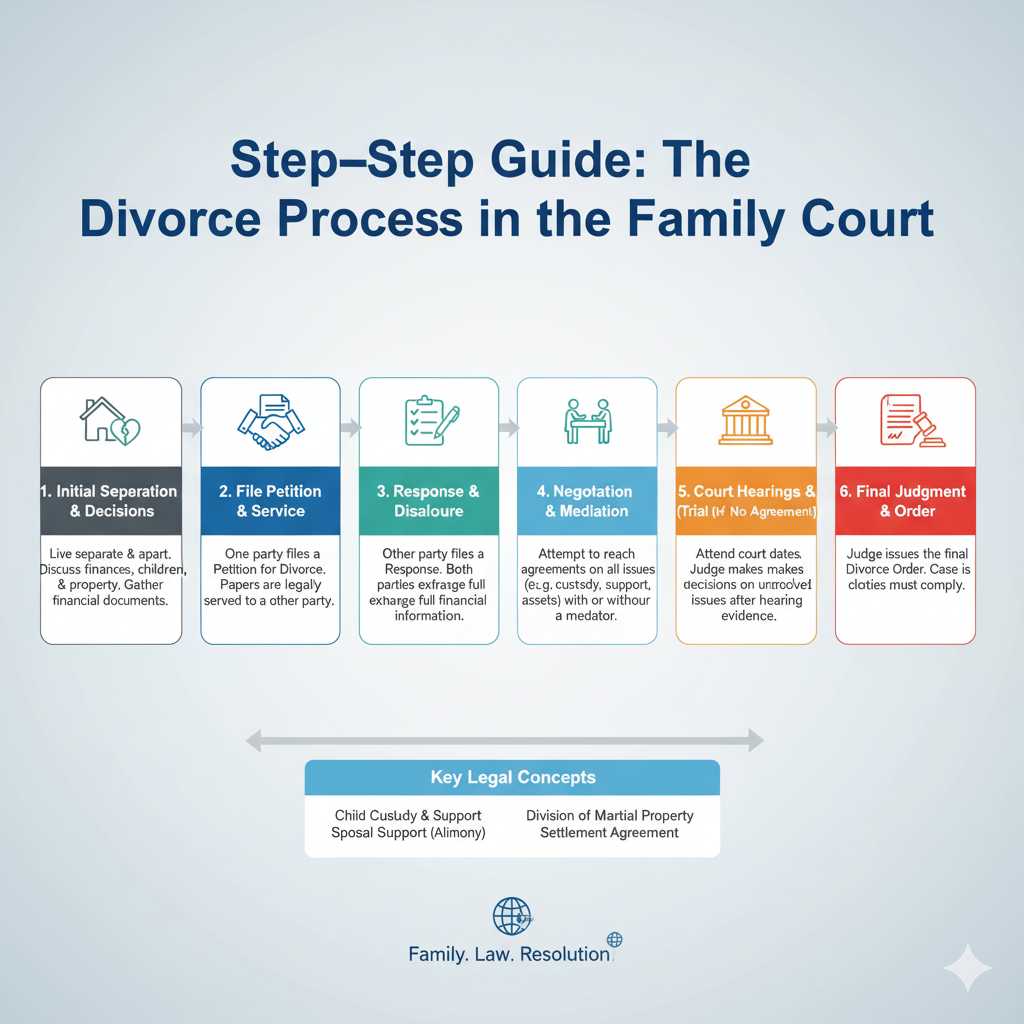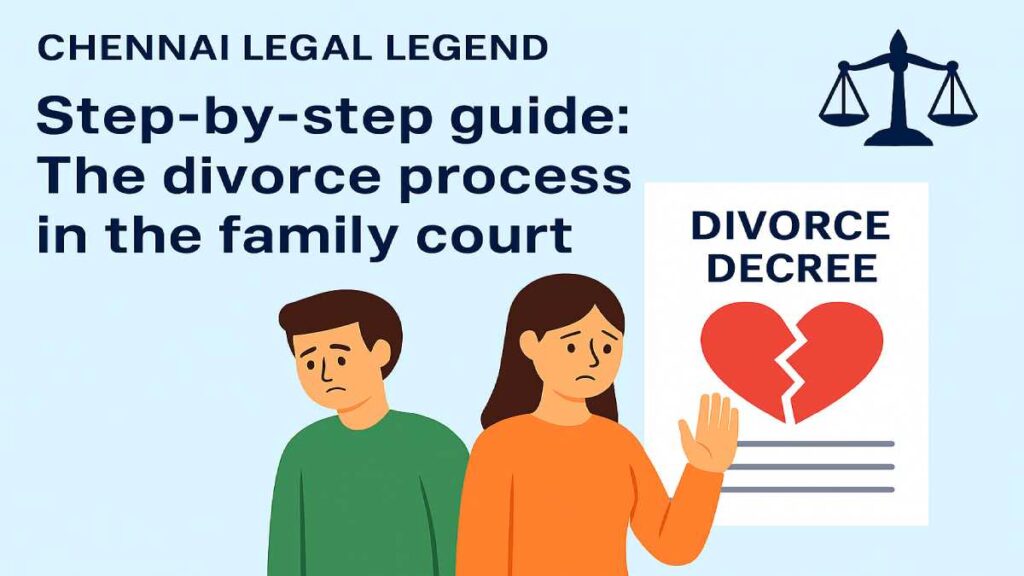Divorce is one of the most difficult and emotional decisions a person can make. It marks the end of a marital relationship but also the beginning of a new chapter in life. In India, divorce is not just a personal decision—it is also a legal process governed by family law. Understanding each step of this process can make it easier to handle both emotionally and practically.
At Chennai Legal Legend, we have guided numerous clients through the divorce process with compassion, clarity, and strong legal representation. This article provides a step-by-step guide to help you understand how divorce cases proceed in the Family Court, what documents are required, and what to expect at each stage.
Step-by-Step Guide: The Divorce Process in the Family Court: Chennai Legal Legend

Understanding Divorce in India
Divorce in India can be mutual or contested. The process and duration depend on which type applies to your situation.
- Mutual Consent Divorce: Both spouses agree to end the marriage peacefully. It is faster, less stressful, and usually concluded within 6 months to 1 year.
- Contested Divorce: One spouse seeks divorce while the other opposes it. This involves a longer court process and may include issues like cruelty, desertion, adultery, or mental harassment.
Different personal laws apply depending on religion—such as the Hindu Marriage Act (1955), Special Marriage Act (1954), Christian Divorce Act, Muslim Personal Law, and others.
Step 1: Choosing the Right Type of Divorce
The first and most important step is to decide whether you and your spouse can mutually agree to separate or not.
If both partners are willing and there are no disputes regarding alimony, child custody, or property, then mutual consent divorce is the best option. However, if there is disagreement, a contested divorce petition must be filed.
At Chennai Legal Legend, we help clients evaluate their situation carefully, explain both options, and choose the most effective legal path.
Step 2: Consulting a Family Law Advocate
Before taking any legal step, it is wise to consult an experienced family law advocate. A lawyer can explain your rights, prepare the necessary documents, and represent you in court.
A skilled advocate ensures that your petition is drafted clearly and that all important facts are presented properly. At Chennai Legal Legend, our lawyers handle everything—from filing petitions and gathering evidence to negotiating settlements and representing clients in both Family Courts and the Madras High Court.
Step 3: Preparing the Divorce Petition
The divorce process officially begins with the divorce petition. This is a formal written request submitted to the Family Court, stating the reasons for divorce and the relief sought (such as custody, alimony, or division of property).
A mutual consent petition must include:
- Details of both spouses.
- Date and place of marriage.
- Proof of separation for at least one year.
- Agreement on maintenance, property, and child custody.
In a contested divorce petition, specific grounds must be mentioned, such as:
- Cruelty (mental or physical abuse).
- Adultery.
- Desertion for two years or more.
- Conversion to another religion.
- Unsoundness of mind or incurable disease.
Your lawyer drafts the petition, ensuring it complies with the respective personal law.
Step 4: Filing the Petition in Family Court
Once the petition is ready, it must be filed in the Family Court that has jurisdiction. Generally, the petition can be filed where:
- The marriage was solemnized,
- The couple last lived together, or
- The respondent currently resides.
After filing, the court assigns a case number and fixes a date for the first hearing. In mutual consent cases, both parties must appear together and confirm their willingness to divorce.
In contested cases, the court issues a notice to the respondent (the other spouse) to appear and reply to the petition.
Step 5: The First Hearing and Response
At the first hearing, the court verifies the identities of both parties and reviews the petition.
In mutual consent divorce, both spouses give a joint statement confirming that they have mutually agreed to end their marriage. The court then records their consent and schedules the second motion (final hearing) after a six-month cooling-off period.
In contested divorce, the respondent files a written statement (reply) denying or accepting the claims. The court may attempt to reconcile the couple through mediation or counseling before proceeding with the trial.
Step 6: Mediation and Counseling
Family Courts in India emphasize reconciliation before granting divorce. Therefore, the court may send both parties for mediation or counseling sessions.
This process helps couples communicate and reconsider their decision. If reconciliation is possible, the court may close the case. However, if the differences are irreconcilable, the case proceeds further.
Our lawyers at Chennai Legal Legend always prioritize peaceful resolutions first. But if reconciliation fails, we ensure that our client’s rights and dignity are fully protected during the trial.
Step 7: Evidence and Witness Examination (In Contested Cases)
If mediation fails, the court moves to the trial stage. Both parties are allowed to present their evidence, documents, and witnesses.
Common types of evidence include:
- Marriage certificate.
- Proof of residence.
- Communication records (calls, messages, emails).
- Medical or police reports (in cases of cruelty).
- Financial records for maintenance or property issues.
Each side’s lawyer examines and cross-examines witnesses to prove their case. This stage can take several months, depending on the complexity of the case.
Step 8: Interim Orders
During the divorce proceedings, the court can issue interim orders to protect the interests of the parties. These may include:
- Temporary maintenance or alimony.
- Custody and visitation arrangements for children.
- Protection orders in case of harassment.
Such interim relief helps ensure that no party suffers unfairly while the case is pending.
Step 9: Final Hearing and Judgment
After all evidence and arguments are presented, the court conducts the final hearing. Both parties, along with their lawyers, make closing statements.
In mutual consent divorce, if both spouses confirm their consent during the second motion (after the cooling-off period), the court grants the divorce decree immediately.
In contested cases, the court evaluates the evidence and decides whether the grounds for divorce are proved. The judge then issues a final decree of divorce, legally dissolving the marriage.
Once the decree is issued, both parties are free to remarry or live separately.
Step 10: Post-Divorce Legal Matters
Even after the divorce decree, certain legal aspects may need attention, such as:
- Transfer of property ownership or assets.
- Execution of maintenance or alimony payments.
- Modification of child custody or visitation rights.
- Updating legal documents (PAN, passport, bank records, etc.).
At Chennai Legal Legend, we continue to assist clients after divorce to ensure that all legal and practical matters are properly settled.
Documents Required for Divorce Filing
To ensure a smooth process, keep these documents ready:
- Marriage certificate.
- Identity proofs of both spouses.
- Address proofs.
- Passport-size photographs.
- Proof of separation or correspondence.
- Income and asset details (for maintenance cases).
- Details of children (if any).
- Evidence supporting divorce grounds (in contested cases).
Having complete documents helps your lawyer present a strong and organized case.
Duration of the Divorce Process
The time required depends on the type of divorce:
- Mutual Consent Divorce: Typically completed within 6 months to 1 year.
- Contested Divorce: May take 2 to 5 years, depending on complexity, cooperation, and evidence.
While the process may seem long, professional legal guidance can make it less stressful and more efficient.
Legal Remedies Available During Divorce
Divorce cases often involve additional legal remedies, such as:
- Maintenance (Section 125 CrPC): For financial support.
- Domestic Violence Protection Orders: For protection from abuse.
- Child Custody Orders: For welfare of children.
- Injunction Orders: To prevent harassment or disposal of assets.
Our lawyers at Chennai Legal Legend help clients seek appropriate interim or permanent relief based on their needs.
Divorce for NRIs and Overseas Indians
For Non-Resident Indians (NRIs), the divorce process can be complex, especially when one spouse lives abroad.
NRIs can file for divorce in India under Indian personal laws if the marriage was registered here. Courts may also recognize foreign divorce decrees, but only if they meet Indian legal standards.
We at Chennai Legal Legend specialize in NRI divorce cases, ensuring proper coordination between Indian courts and foreign jurisdictions, so that clients receive fair and enforceable outcomes.
How Chennai Legal Legend Helps
At Chennai Legal Legend, we provide complete legal support in all family law matters, including mutual consent and contested divorces. Our services include:
- Expert legal consultation and strategy planning.
- Drafting and filing divorce petitions.
- Representation in Family Courts, Madras High Court, and Supreme Court.
- Assistance with mediation, alimony, and child custody.
- Post-divorce documentation and enforcement of court orders.
We focus on delivering compassionate, professional, and result-driven legal services to every client—because every case deserves personal attention and respect.
Tips for a Smooth Divorce Process
- Stay Calm and Organized: Emotional control helps in making clear decisions.
- Keep All Documents Ready: Proper documentation saves time.
- Communicate Through Lawyers: Avoid direct conflicts.
- Prioritize Children’s Welfare: Always put their needs first.
- Be Honest and Cooperative: Courts value transparency and good faith.
Frequently Asked Questions
The first step is to consult an experienced family law advocate to understand your rights and legal options. Then, a divorce petition is drafted—either for mutual consent or contested divorce—depending on whether both partners agree to the separation. The petition is then filed in the Family Court with necessary documents like marriage certificate, ID proofs, and evidence supporting your case.
The duration depends on the type of divorce. A mutual consent divorce usually takes 6 months to 1 year, as the court requires a cooling-off period between the first and second motions. A contested divorce, where one spouse opposes the separation, may take 2 to 5 years or more, depending on the complexity and cooperation between both parties.
Yes. If one spouse lives outside India, a divorce case can still be filed in India under Indian laws, provided the marriage was solemnized or registered here. NRIs can authorize a lawyer through a Power of Attorney to represent them in court. Chennai Legal Legend also assists in coordinating NRI divorce cases between Indian and foreign courts.
Family Courts encourage reconciliation through mediation or counseling. If both spouses decide to withdraw the petition after mutual understanding, the court may close the case without granting divorce.
Essential documents include marriage certificate, address and ID proofs, photographs, proof of separation, income details, and any evidence supporting divorce grounds such as messages, medical or police reports, or witness statements.
Conclusion
Divorce is not just a legal separation—it is a major life transition that requires emotional strength and professional support. Understanding the step-by-step process helps individuals make informed choices and move forward with clarity.
At Chennai Legal Legend, we guide our clients through every stage of the divorce process with sensitivity, precision, and commitment. Whether it’s mutual consent or a contested case, our team ensures that your rights are protected and your future is secure.
Read More
- The Role of a Divorce Lawyer in Child Custody Battles
- How Property and Assets Are Divided During Divorce Proceedings
- Contested vs. Mutual Divorce: Which Path Should You Choose?
- 10 Things to Know Before Hiring a Divorce Lawyer in India
- Unlock Business Potential with India Entry Services
- Ministry of Housing and Urban Affairs (MoHUA):
- Ministry of Information and Broadcasting (MIB)
- National Legal Services Authority (NALSA):
- Antitrust and Competition Law: How to find the Best Lawyers?
- Civil Litigation Help
- Legal Remedy for Criminal Cases

